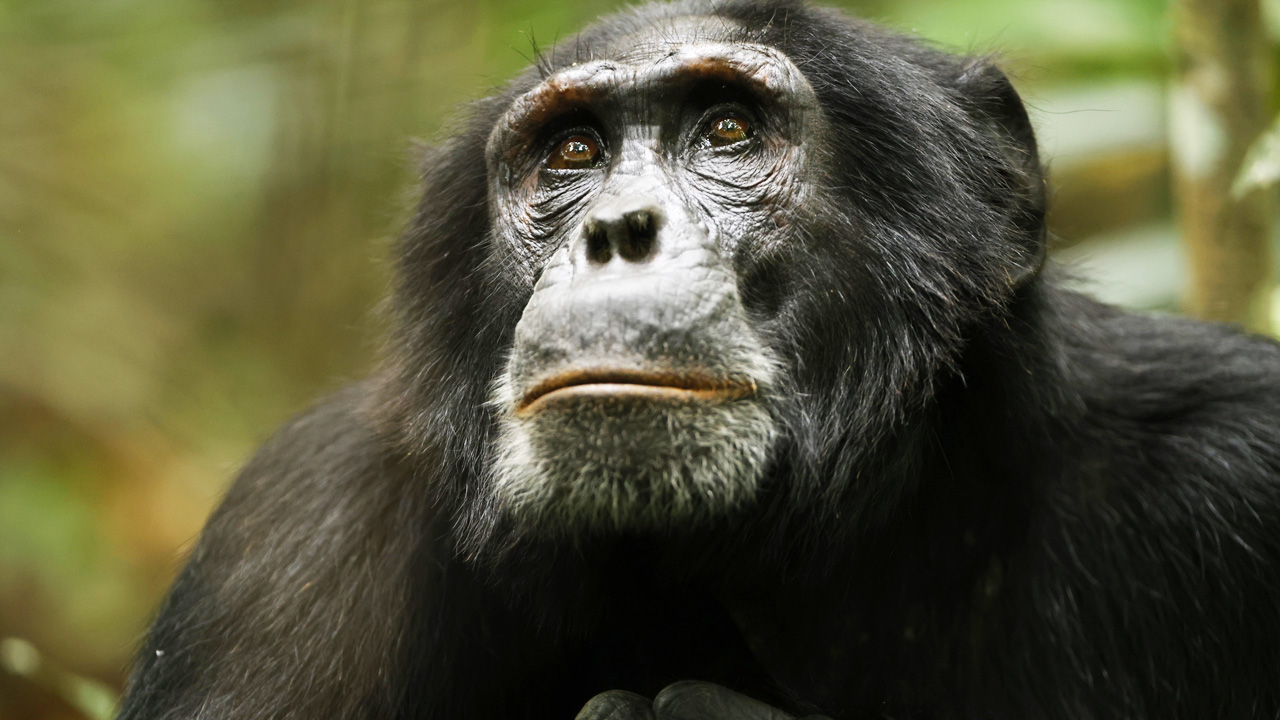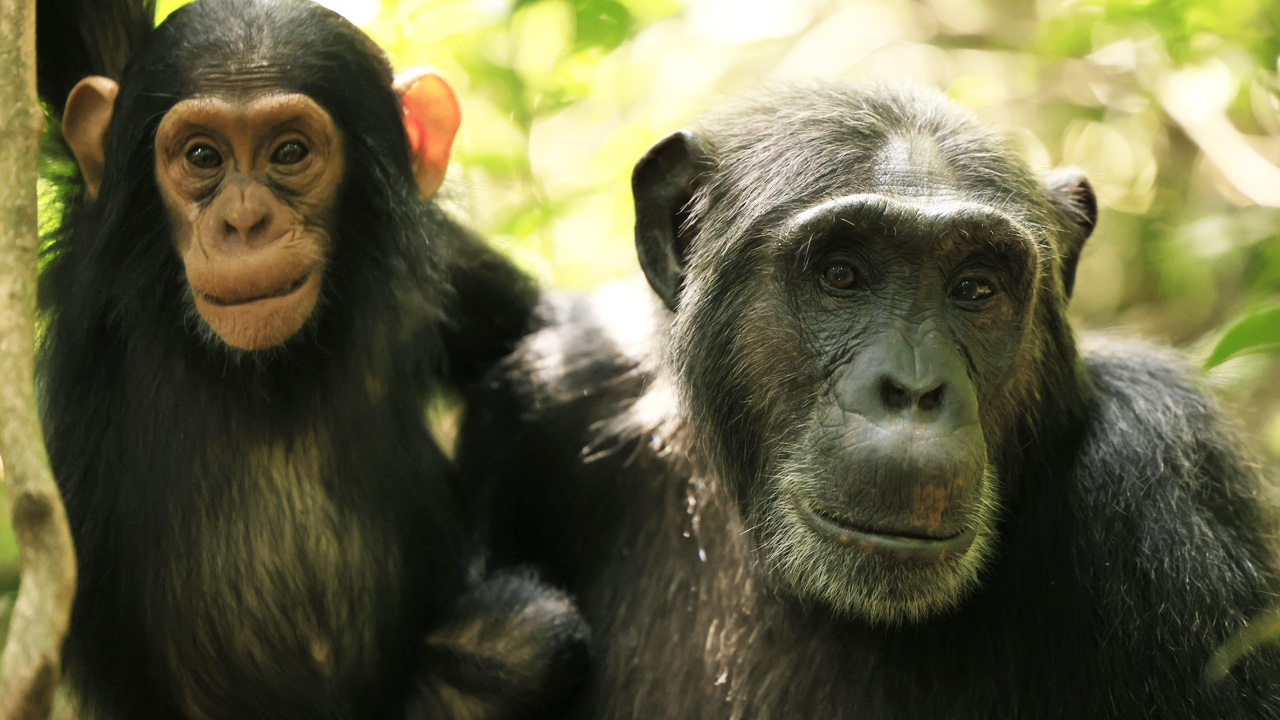Let’s talk about the voice-over narration in Chimp Empire

Netflix’s series Chimp Empire is the latest nature documentary to use extensive voice-over narration, cramming animals into storylines made by and for humans. We should move beyond this kind of storytelling, says Luke Buckmaster.
Goodness me, there’s a lot of talk about chimps in Chimp Empire. I know what you’re thinking and yes, it’s justified, in the sense this is a production about a community of chimpanzees living in a Ugandan forest—so one hardly feels duped by the continued presence of them visually and conversationally. But narrator Mahershala Ali really lays it on thick, not just just making big summarising statements but rambling on about the minutiae of the chimps’ lives—including their emotions, fears, allegiances, power-plays, hopes and dreams. His heavy-handed commentary slathers every sequence like a thick gooey butter.
By about 30 minutes I found myself wondering: can I pay him to stop talking? And: why does this passé version of the nature documentary still exist? This format, which eschews the wonderful exoticism of animals to cram them into the kind of human-centric stories we’ve heard a zillion times before, was given a boon by the huge success of the Morgan Freeman-narrated 2o05 film March of the Penguins. And in Netflix’s new series it returns with a vengeance.
Film and television have a long history of anthropomorphizing animals. Often in happy-go-lucky productions with no aspirations towards realism—like Disney animated musicals, which use dancing bears and singing crabs to cute-ify stories about family and acceptance. Then there’s productions like Chimp Empire, which assign human characteristics, names and behaviours to actual animals, presenting narratives articulated by a narrator who seems convinced that they have access to another species’ inner thoughts. And these thoughts, apparently, are just like our own.
Early on in the first episode, accompanied by poignant piano music, Ali asks: “who are we? How did we become the way we are?” This rightly (but not necessarily intentionally) indicates that director James Reed—who co-helmed My Octopus Teacher—is primarily interested not in understanding chimps but using them to understand us. But then things quickly get weird. “As humans we spend our lives trying to understand ourselves,” continues Ali. “But sometimes it feels we’re too close to see clearly. That’s why we love stories from other worlds…stories all the more powerful, because they are real.”
Actually, they’re not real. Stories aren’t like fruit or trees or mountains or rivers. They are imagined. If they involve summarising actual events, they are subjective and anecdotal. Furthermore, why suggest that understanding humans is a process best outsourced to apes? Chimp Empire attempts to justify this by reminding us that humans and chimps share large amounts of the same DNA, but that justification feels half-baked. Especially given the show is so clear in its attempt to cram the chimps into templated narratives. Netflix’s website even compares the series to a certain high-rating show about power-wrangling and family dynasty, its website declaring that “Chimp Empire has all the cutthroat drama of succession politics.” It’s the Roy family, but as apes.
These Roy surrogates live at a research site called Ngogo. This, we are told, is “a chimpanzee paradise” with loads of fruit and trees as far as the eyes can see. But…there’s trouble in paradise! “Life here involves politics and power,” says Ali, and chimps are “always looking for the opportunities to move up.”

We’re introduced to Jackson (yes: all the chimps have human names) and informed that he’s the most powerful chimp in the community. The director visually reiterates this by cutting to a chimp looking up at Jackson, sitting high in a tree. Jackson has been in charge for six years now, we’re told, and “if he’s going to stay on top, he can’t show any weakness.” However he “is well aware that some chimps are showing less respect than others.” Ali then introduces Miles, Jackson’s right hand man-chimp. There’s much discussion about grooming partners, bonds and animosities, who is seeking out who, building allegiances, weakening the ruler, etcetera. On several occasions I wanted to ask: “dude, how the hell do you know that?”
In the first episode we’re told that an ape named Gus “is still alone, but he’s got a plan.” Soon later, Ali says “Jackson can feel Abrams closing in.” In episode two, we’re told that the 44-year-old Garrison “knows every tree at Ngogo” and “has a map of the entire forest in his head.” There’s much more where this came from.
I’m not saying every observation made in Chimp Empire is entirely wrong. But the series crosses the line so many times, squeezing the chumps into retroactively contrived narratives clearly engineered by and for humans (“all the cutthroat drama of succession politics!”) that everything starts to feel artificial. Some elements of artifice are well known in nature documentaries: it’s an open secret for example that while cameras are capable of zooming in from far away, sound recording is very different, resulting in most of the things we hear being inserted in the editing room. Productions like Chimp Empire trade in an additional layer of falsity, presenting dubious narrative structures that pretend animals think and feel just like us.
So what does a genuine, lifelike depiction of the natural world look like? An obscure 2018 film called The Pure Necessity is both one of the strangest and most authentic depictions of the wilderness. Belgian video artist David Claerbout and a team of animators redrew every frame of Disney’s 1967 adaptation of The Jungle Book, removing all anthropomorphic elements. There’s no songs, no dialogue of any kind, no human protagonist, no prescribed storyline, no moral perspective. Just animals, doing animal stuff, for their own reasons. A “pure” experience.
The film is about watching nature for what it is—not what we want it to be. The Pure Necessity has never been released, due to obvious copyright issues. But even if it was made available it would hardly spark a movement or draw big audiences; movie viewers appreciate and expect precisely sculpted narratives. In the words of Jean-Luc Godard: “Sometimes reality is too complex. Stories give it form.”
But when we watch something like Chimp Empire, let’s not kid ourselves about where that form comes from, who it’s intended for, and whose tales it tells. The subjects in Chimp Empire are technically chimpanzees—but they’re treated as humans, infused with our emotions, squeezed into our stories, forced into our way of thinking. Why can’t we let animals be animals?
















